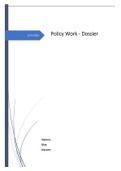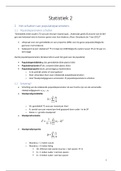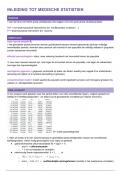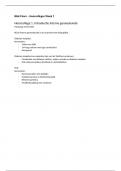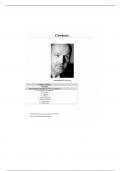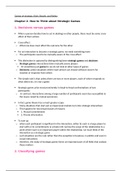Michael Lacewing
Personal identity
A FIRST DISTINCTION
In order to understand what is at issue in personal identity, it is important
to distinguish between numerical identity and qualitative identity.
Throughout life, we change what we are like as people. In common speech,
we often say things like ‘he was a different person after the cancer scare’.
This use of ‘different person’ picks out a qualitative change. But it
presupposes that there is just one person here, before and after the cancer
scare – otherwise, who does ‘he’ refer to? Persons can persist through
qualitative change. What it is for a person to persist through time is the
question of numerical identity – what does it take for someone to be the
same person in this sense?
NECESSARY AND SUFFICIENT CONDITIONS
Philosophers talk about ‘necessary and sufficient conditions’ for being
numerically the same person over time. What does this mean?
Necessary and sufficient conditions can be understood in terms of ‘if…
then…’ statements (called ‘conditionals’). Such statements relate the truth
of two propositions, e.g. ‘it is raining’ and ‘I am getting wet’, as in ‘If it is
raining, I am getting wet’. The conditional asserts that if the first statement
(known as the antecedent) is true, then the second statement (the
consequent) is also true.
Suppose the conditional is true: if it is raining, I am getting wet. Notice that
this does not say that it is raining and I am getting wet. Instead, it says that
there is a relationship between it raining and my getting wet. Another
example: if the planet Mercury didn’t exist, the Earth would be the second
planet from the Sun. This obviously does not say that Mercury doesn’t exist!
Here are two conditionals about personal identity:
1. ‘If I am the same person at times t1 and t2, then….’
2. ‘If …, then I am the same person at times t1 and t2.’
One way to fill in the blanks, that we’ll discuss below, is ‘I remember at t2
what I did at t1’. So:
i. ‘If I am the same person at times t1 and t2, then I remember at t2
what I did at t1.’
ii. ‘If I remember at t2 what I did at t1, then I am the same person at
times t1 and t2.’
Is this always true? That’s what we’ll discuss.
, Using necessary and sufficient conditions
Philosophers want to find out is what goes in each of the blanks, so that the
conditional always turns out true. If we could do that, we will have
discovered something important about personal identity. Why?
Filling in (1) will give a necessary condition: for me to be the same person,
something else – the consequent – must be true, e.g. I remember the earlier
event. Just by knowing I’m the same person, we will know something else
about me. So we give an analysis of personal identity.
Filling in (2) will give a sufficient condition: for me to be the same person,
it is enough that the antecedent is true. If we know the antecedent is true,
we know that I must be the same person.
It might be that the same statement fills the blanks in (1) and (2). The
statement is then both necessary and sufficient for personal identity. In that
case we have a complete analysis of personal identity.
PERSONS AS MINDS/SOULS
Cartesian dualism claims that I am a mental substance, and the persistence
of this mental substance is what personal identity consists in. A substance is
something that can exist independently of anything else. So I do not depend
on any body in order to be and continue being me. A related view is that
persons are souls, continuing their existence as the same soul after death.
If persons are mental substances (minds or souls), then we can say that the
continued existence of the mental substance is what personal identity
consists in. In other words, having the same soul is necessary and sufficient
for being the same person.
There are three arguments we could give for the view that persons are
mental substances. First, that no other theory works. We can’t know this
until we’ve looked at the alternatives. Second, religious doctrine – which we
shan’t discuss. We turn to the third argument, from Descartes, now. (The
argument is adapted from Meditation II.]
Descartes’ argument
Let us assume that you and I and Descartes are persons. What is it for each
of us to exist? Which properties, if I lost them, would mean I would no
longer be what I am? Suppose I didn’t have a body. For example, suppose
that I am a disembodied mind that is telepathically being fed false
experiences of having a body. Does this make sense? Would I be me? Yes,
says Descartes. I can doubt whether I have a body. But I can’t doubt
whether I exist. So even if I didn’t have a body, that wouldn’t show I didn’t
exist. So having a body isn’t essential to continuing to exist as me.
Personal identity
A FIRST DISTINCTION
In order to understand what is at issue in personal identity, it is important
to distinguish between numerical identity and qualitative identity.
Throughout life, we change what we are like as people. In common speech,
we often say things like ‘he was a different person after the cancer scare’.
This use of ‘different person’ picks out a qualitative change. But it
presupposes that there is just one person here, before and after the cancer
scare – otherwise, who does ‘he’ refer to? Persons can persist through
qualitative change. What it is for a person to persist through time is the
question of numerical identity – what does it take for someone to be the
same person in this sense?
NECESSARY AND SUFFICIENT CONDITIONS
Philosophers talk about ‘necessary and sufficient conditions’ for being
numerically the same person over time. What does this mean?
Necessary and sufficient conditions can be understood in terms of ‘if…
then…’ statements (called ‘conditionals’). Such statements relate the truth
of two propositions, e.g. ‘it is raining’ and ‘I am getting wet’, as in ‘If it is
raining, I am getting wet’. The conditional asserts that if the first statement
(known as the antecedent) is true, then the second statement (the
consequent) is also true.
Suppose the conditional is true: if it is raining, I am getting wet. Notice that
this does not say that it is raining and I am getting wet. Instead, it says that
there is a relationship between it raining and my getting wet. Another
example: if the planet Mercury didn’t exist, the Earth would be the second
planet from the Sun. This obviously does not say that Mercury doesn’t exist!
Here are two conditionals about personal identity:
1. ‘If I am the same person at times t1 and t2, then….’
2. ‘If …, then I am the same person at times t1 and t2.’
One way to fill in the blanks, that we’ll discuss below, is ‘I remember at t2
what I did at t1’. So:
i. ‘If I am the same person at times t1 and t2, then I remember at t2
what I did at t1.’
ii. ‘If I remember at t2 what I did at t1, then I am the same person at
times t1 and t2.’
Is this always true? That’s what we’ll discuss.
, Using necessary and sufficient conditions
Philosophers want to find out is what goes in each of the blanks, so that the
conditional always turns out true. If we could do that, we will have
discovered something important about personal identity. Why?
Filling in (1) will give a necessary condition: for me to be the same person,
something else – the consequent – must be true, e.g. I remember the earlier
event. Just by knowing I’m the same person, we will know something else
about me. So we give an analysis of personal identity.
Filling in (2) will give a sufficient condition: for me to be the same person,
it is enough that the antecedent is true. If we know the antecedent is true,
we know that I must be the same person.
It might be that the same statement fills the blanks in (1) and (2). The
statement is then both necessary and sufficient for personal identity. In that
case we have a complete analysis of personal identity.
PERSONS AS MINDS/SOULS
Cartesian dualism claims that I am a mental substance, and the persistence
of this mental substance is what personal identity consists in. A substance is
something that can exist independently of anything else. So I do not depend
on any body in order to be and continue being me. A related view is that
persons are souls, continuing their existence as the same soul after death.
If persons are mental substances (minds or souls), then we can say that the
continued existence of the mental substance is what personal identity
consists in. In other words, having the same soul is necessary and sufficient
for being the same person.
There are three arguments we could give for the view that persons are
mental substances. First, that no other theory works. We can’t know this
until we’ve looked at the alternatives. Second, religious doctrine – which we
shan’t discuss. We turn to the third argument, from Descartes, now. (The
argument is adapted from Meditation II.]
Descartes’ argument
Let us assume that you and I and Descartes are persons. What is it for each
of us to exist? Which properties, if I lost them, would mean I would no
longer be what I am? Suppose I didn’t have a body. For example, suppose
that I am a disembodied mind that is telepathically being fed false
experiences of having a body. Does this make sense? Would I be me? Yes,
says Descartes. I can doubt whether I have a body. But I can’t doubt
whether I exist. So even if I didn’t have a body, that wouldn’t show I didn’t
exist. So having a body isn’t essential to continuing to exist as me.


